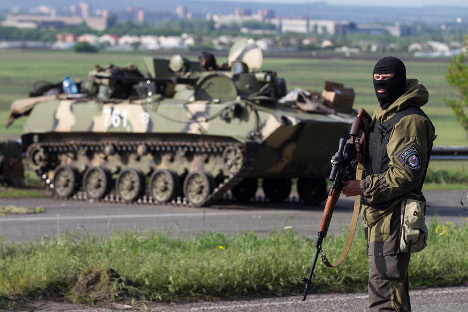
The withdrawal of heavy weaponry from front lines in eastern Ukraine is one of the topics being discussed at talks in Minsk on Dec. 24-26. Source: Reuters
Reporting on the beginning of a fresh round of talks aimed at regulating the ceasefire in Ukraine, Rossiyskaya Gazeta writes that according to Alexander Zakharchenko, head of the unrecognized Donetsk People’s Republic in the Donbass region of eastern Ukraine, the main topic of Dec. 24 negotiations between the trilateral contract group (Russia, Ukraine, and the Organization for Security and Cooperation in Europe) was an “all-for-all” prisoner exchange.
The plenipotentiary envoy from the breakaway republic, Deputy Speaker of the Donetsk People’s Republic’s Parliament Denis Pushilin, also said that “four issues were on the agenda – the removal of artillery and rocket launchers to a safe distance from the line of demarcation, the prisoner exchange, the removal of the economic blockade of the Donbass, and the implementation of a law on special status for the Donbass within Ukraine.”
The other self-proclaimed republic in the Donbass, the Lugansk People’s Republic, made it clear last week that it would only agree to sit down at the negotiating table if the two latter topics were added to the agenda.
All these topics were also discussed during the contact group’s previous meetings in Minsk. However, the parties to the conflict later accused each other of violating the agreements. In the run-up to the Dec. 24 meeting in the Belarusian capital of Minsk, cautious predictions were being made in the Donbass regarding the potential outcomes.
Zakharchenko openly admitted that he did not anticipate any breakthroughs and was primarily expecting to make some progress on the prisoner exchange. Meanwhile, Deputy Head of International Affairs for the Ukrainian Presidential Administration Valeriy Chaliy stated that “the negotiators may reach some concrete result on Friday,” referring to the second meeting scheduled for the end of the week.
The centrist newspaper Nezavisimaya Gazeta writes that the talks in Minsk are unlikely to put an end to the conflict in Ukraine. “They will discuss tactical maneuvers aimed at removing the tension in the region as quickly as possible. Each party’s strategic goals will remain unchanged, meaning that they are mutually exclusive,” a Kiev-based correspondent reports.
Ukraine, Russia, Germany, and France had previously arrived at the conclusion that an agreement needed to be made in Minsk to secure a full ceasefire in the Donbass. They also agreed on the need to remove all heavy weaponry from the line of demarcation, to conduct an “all-for-all” prisoner exchange, and to ensure the safe delivery of humanitarian aid to the areas controlled by the Donetsk and Lugansk people’s republics.
Meanwhile, representatives of the breakaway republics have voiced the need to add two other items to the agenda: the removal of the economic blockade of the Donbass and the implementation of the new law assigning special status to the region. That would entail restoring financing for the Donbass from the Ukrainian state budget while simultaneously assigning the region autonomy of some sort. The Lugansk and Donetsk people’s republics have not indicated any willingness to abandon the idea of independence, and Kiev has no intention of declaring them independent.
Valentin Badrak, an expert at the Center for Army, Conversion, and Disarmament Studies, explained that new tensions are inevitable because the opposing parties face little chance of achieving their strategic objectives. Russia will not let go of Crimea or of its intention to establish a land corridor to the peninsula. At the same time, Ukraine will not recognize Crimea’s Russian status and will fight to maintain control over the entire territory of the country. Meanwhile, the West will not reconcile itself to a redrawing of Ukraine’s borders in violation of international law.
“What we’re seeing right now at the negotiations in Minsk is not peace; it is a postponement of war,” Badrak said.
The Izvestia daily broadsheet cites Alexander Zakharchenko, leader of the unrecognized Donetsk People’s Republic, as saying that the key topic of the contact group’s negotiations is an “all-for-all” prisoner exchange. The delegates from the republic are expecting a positive solution to this issue in Minsk and note that the parties have already reached a mutual understanding.
“There is already serious progress both on the prisoner exchange and on implementing a gradual peace plan,” Deputy Speaker of the Donetsk People’s Republic’s Parliament Denis Pushilin told Izvestia. “With respect to the economic part – the economic blockade of the Donbass and the preservation of economic ties between the Donbass and Kiev – we have big problems there. The same goes for the topic of special status,” he said.
Chairman of the People’s Council of the Lugansk People’s Republic Alexei Karyakin said that Kiev’s position is not very constructive.
But in the opinion of Deputy Head of the Ukrainian Presidential Administration Valeriy Chaliy, no one should expect any solid results from the first meeting in Minsk. “Our work will achieve some kind of result” only on Dec. 26, he said.
Zakharchenko, meanwhile, thinks the contact group will continue its negotiations regarding a settlement to the situation in southeast Ukraine. However, it is too early to know the details or agenda for those future talks. According to Zakharchenko, the Dec. 24 consultations were “complicated.”
All rights reserved by Rossiyskaya Gazeta.
Subscribe
to our newsletter!
Get the week's best stories straight to your inbox